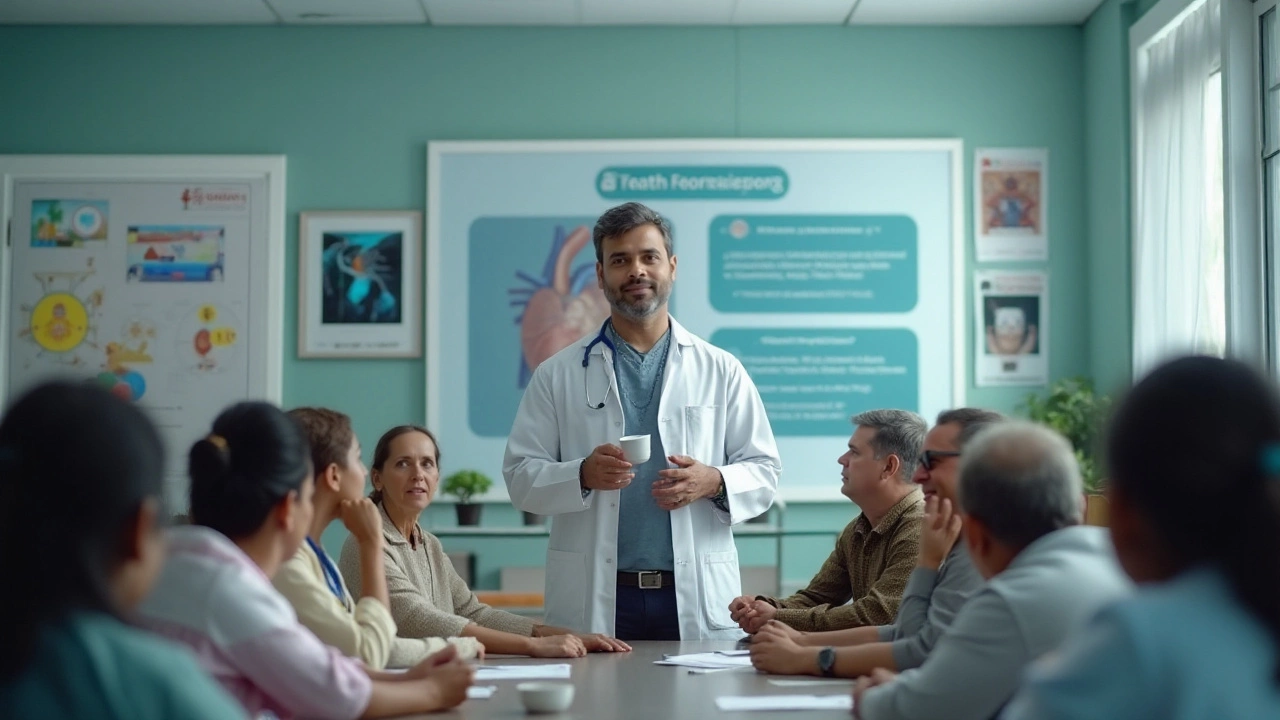- Home
- ::
- Understanding Life Expectancy After Open-Heart Surgery: What You Need to Know

Understanding Life Expectancy After Open-Heart Surgery: What You Need to Know
Open-heart surgery is a pivotal experience that brings with it many questions, one of the most pressing being about life expectancy after the procedure. Understandably, patients and their loved ones are keen to learn about what the future might hold. As medical technology has evolved, so too has the potential for extended and improved quality of life following such a major operation.
Several factors play into the recovery and outlook after open-heart surgery. From age and general health to the type of surgery performed, each element contributes to the overall prognosis. What's heartening is that with each passing year, advancements in surgical techniques have opened doors to new possibilities and better results.
In this guide, we'll delve into these key influences, offering insight into what to anticipate post-surgery. Moreover, we'll look at the importance of ongoing care and lifestyle adaptations that can make a significant difference in not just surviving, but thriving after surgery.
- Factors Influencing Life Expectancy
- Advancements in Surgical Techniques
- Post-Surgery Recovery and Care
- Lifestyle Changes for Better Outcomes
Factors Influencing Life Expectancy
When it comes to understanding life expectancy after open-heart surgery, several complex factors intertwine to shape outcomes. Among these, a patient's age stands out as a pivotal element. Older patients may face additional challenges during recovery, yet it's not just the chronological age that matters. Biological age — influenced by lifestyle habits, genetics, and preexisting health conditions — can often provide a more accurate picture of recovery potential.
Pre-surgery health is another critical aspect, as those entering surgery with conditions like diabetes or chronic pulmonary issues might encounter a tougher recovery journey. However, this doesn’t mean that recovery is out of reach. Medical history, including past cardiac events or surgeries, can play a role in shaping the journey post-surgery. Understanding these risks helps doctors tailor post-operative care for individual needs, fostering a more personalized health strategy.
In addition to medical factors, psychological resilience is emerging as a significant player in life expectancy after heart surgeries. Patients with strong support systems and positive attitudes often experience smoother recoveries. The role of mental health in physical recovery underscores the interconnectedness of emotional and physical well-being. A holistic approach that considers both medical and psychological care can boost life expectancy notably.
One cannot overlook the influence of modern surgical techniques either. The leap in technological advancements over recent decades has paved the way for more precise and less invasive procedures. Access to cutting-edge techniques can substantially improve recovery times and long-term outcomes. A study published in the Journal of Thoracic and Cardiovascular Surgery notes, "minimally invasive techniques have reduced hospital stays and complications, leading to a quicker return to daily activities."
Socioeconomic factors, often unrecognized in the recovery equation, wield their influence too. Access to quality healthcare, ability to afford medications and lifestyle modifications, all contribute to the overall recovery process. Countries with extensive healthcare systems may offer patients better outcomes through routine follow-up care and rehabilitation programs.
In examining these factors, we recognize that the journey post-surgery is as individual as the patients themselves. Each person's path is shaped by a mixture of personal health, medical care, support systems, and technological access. For those stepping into the recovery phase, knowing these elements can guide better preparedness and proactive health choices, paving the way for a healthier future.

Advancements in Surgical Techniques
The field of open-heart surgery has witnessed transformative advancements over the past few decades, making the procedure safer and more effective than ever before. One significant development is the advent of minimally invasive techniques, which have considerably reduced the associated risks and recovery times. Surgeons now often opt for smaller incisions over traditional open chest methods, which can result in less trauma to the body and a quicker return to daily activities.
Another groundbreaking advancement is the use of robotic-assisted surgery. These cutting-edge robots, while not operating autonomously, offer surgeons increased precision through enhanced visualization and dexterity. By providing a three-dimensional view of the heart and its intricate structures, they allow for more accurate procedures. Such precision reduces potential complications and improves patient outcomes, revolutionizing the approach to heart health.
Incorporating modern technology, many hospitals now employ state-of-the-art imaging techniques, such as 3D printing and virtual reality, for pre-surgical planning. These tools allow surgeons to explore and strategize complex procedures in a simulated environment before entering the operating room. By mapping out the surgery in advance, the likelihood of unforeseen complications is minimized, allowing for safer surgical experiences.
Additionally, there has been significant progress in the development of biocompatible materials. Synthetic grafts and heart valves have seen incredible upgrades, mimicking natural tissue functions and reducing rejection rates. This innovation ensures that patients benefit from longer-lasting implants, further boosting the life expectancy following surgery.
Statistics from recent studies reveal a promising trend: patients undergoing these advanced surgical techniques have demonstrated a reduced need for prolonged hospital stays and exhibit faster recovery timelines compared to traditional methods. This is echoed by renowned cardiologist Dr. James Thornton, who states,
“The integration of technology and surgical expertise is reshaping patient outcomes, offering hope and extended life like never before.”
The overall improvements in surgical techniques extend beyond the procedure itself to cover comprehensive post-surgical care. Enhanced integrated care pathways, including tailored rehabilitation programs, contribute to better recovery strategies, ensuring that patients not only survive but thrive in the years following surgery. As these techniques continue to evolve, the future of heart surgery seems brighter, promising an era where patients can enjoy improved quality and span of life.

Post-Surgery Recovery and Care
Recovering after open-heart surgery is a journey that requires both patience and diligence. The first few weeks post-operation are crucial, as the body needs time to heal from the trauma of surgery. It's not uncommon for patients to experience bouts of fatigue, pain at the incision site, and a rollercoaster of emotions ranging from relief to anxiety. This period is not just about physical healing, but emotional and mental recuperation as well. It's important to remember that each individual's recovery timeline is different, and comparing oneself to others can be counterproductive.
The initial phase of recovery often takes place in a controlled hospital environment where the patient is monitored closely for any complications that might arise. Heart rate, blood pressure, and incision healing are meticulously checked by healthcare professionals to prevent postoperative infections and other issues. After discharge, continuing care at home is paramount. Adhering strictly to prescribed medications, regularly attending follow-up appointments, and keeping up with rehabilitation exercises are all part of the recovery process. Research has shown that patients who actively participate in cardiac rehabilitation programs tend to have better recovery outcomes.
Within the first few weeks at home, it's crucial to avoid activities that may strain the heart or compromise healing. Rest is important, yet equally important is engaging in light physical activities such as walking, which can aid in restoring strength and improving circulation. Daily activities should be gradually increased, listening attentively to the body's signals. This balance helps prevent both overexertion and unnecessary laying back, as both can impede the recovery process. Family and friends play a supportive role during this time, providing both practical help with tasks and emotional encouragement that can significantly lift spirits.
Diet also plays a critical role in recovery. Nutritionists often recommend a diet that is heart-healthy, focusing on reducing sodium intake, and including plenty of fruits, vegetables, lean meats, and whole grains. Avoiding high-fat and high-sugar foods can foster not only improved heart health but also assist in maintaining an optimal weight, reducing undue pressure on the heart. Establishing these dietary changes accustoms the patient to a lifestyle that will be beneficial long after recovery.
Dr. Anita Patel, a renowned cardiac specialist, emphasized, "Recovery isn't just a phase—it's a lifestyle change. Embracing healthy habits post-surgery can drastically improve both longevity and quality of life."
Regularly checking in with healthcare providers ensures that any abnormal symptoms such as increased shortness of breath, chest pain, or excessive swelling are addressed promptly. Such vigilance is critical, as it allows for immediate interventions that can avert serious complications. Learning to recognize these symptoms and reacting accordingly is part of the patient education typically provided by healthcare teams.
All these practices combined nurture a holistic recovery, underpinning the long journey back to health. An open line of communication with healthcare providers, along with a personal commitment to health improvement, can lead to a life that is not only extended but enriched post open-heart surgery.

Lifestyle Changes for Better Outcomes
Adjusting to life after open-heart surgery means taking meaningful steps to improve heart health and extending life expectancy. One of the primary areas of focus should be on dietary habits. A diet rich in fruits, vegetables, lean proteins, and whole grains can significantly reduce the risk of future cardiovascular issues. Heart-friendly nutrients such as omega-3 fatty acids, found in fish like salmon and sardines, should be incorporated regularly. Limiting saturated fats, processed sugars, and sodium helps keep cholesterol and blood pressure in check, both critical for heart health.
Engaging in regular physical activity plays an equally vital role. Most healthcare professionals recommend a tailored exercise regimen that balances aerobic activities like walking, swimming, or cycling, with strength training to bolster muscle health and endurance. Starting slowly and gradually increasing intensity under the guidance of a healthcare provider can prevent undue stress on the heart. Additionally, exercise aids in controlling weight, boosting mental health, and improving circulation, all contributing positively to post-surgery recovery.
Breaking the smoking habit is non-negotiable for anyone seeking extended life expectancy after heart surgery. Smoking is a leading factor that adversely affects coronary artery health, negating the benefits of surgical intervention. Quitting smoking, while challenging, can dramatically decrease the risk of heart attack and stroke. For those needing help, resources such as counseling, nicotine replacement therapies, and support groups can be extremely beneficial.
"Smoking cessation is one of the most effective ways to improve heart health," notes the American Heart Association. "Quitting is tough, but it is one of the best things you can do for your heart."
Stress management is another crucial component of a heart-healthy lifestyle. Chronic stress can lead to unhealthy behaviors like poor diet choices and physical inactivity, which in turn impact heart health. Practices such as meditation, yoga, and deep breathing exercises can help in reducing stress levels. It's also advantageous to engage in hobbies and activities that bring joy and relaxation. Seeking professional help when needed can provide the support necessary to manage stress effectively.
Regular follow-up visits with healthcare providers are essential to monitor heart health and detect any potential complications early. These check-ups allow adjustments to medications as needed and provide an opportunity for healthcare professionals to recommend lifestyle modifications. Moreover, having open conversations with doctors about any symptoms or concerns ensures that patients remain proactive about their health. Setting realistic goals and tracking progress can be incredibly motivating and lead to lasting changes.

 Health and Wellness
Health and Wellness





Write a comment